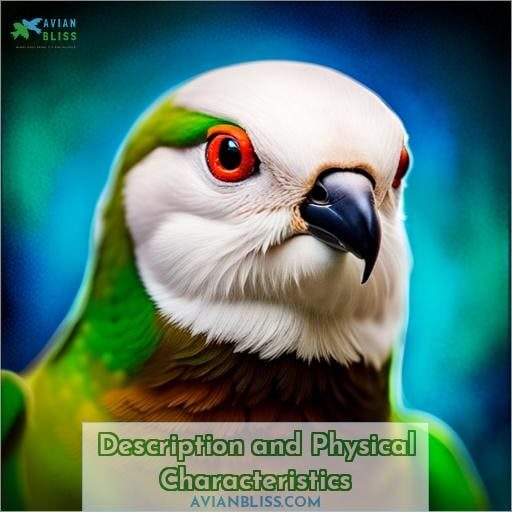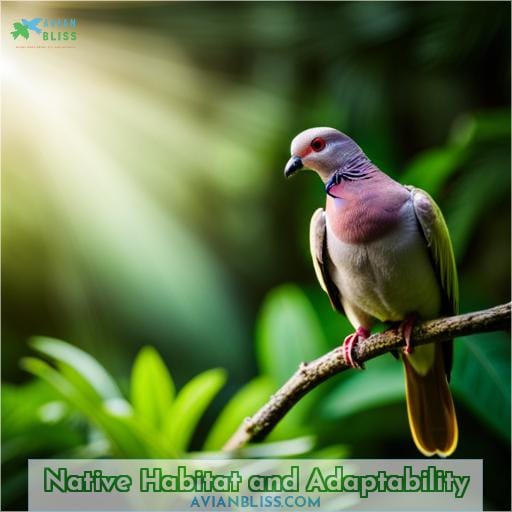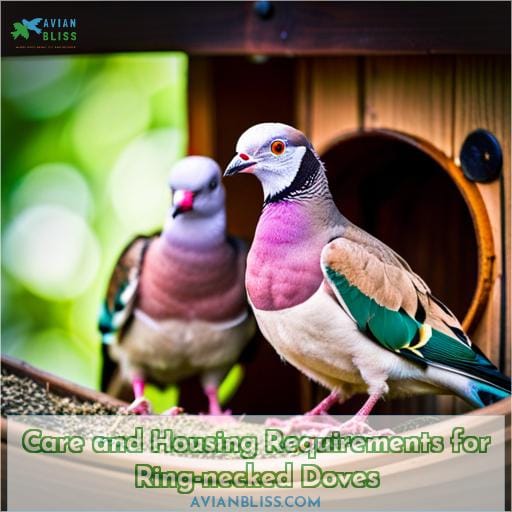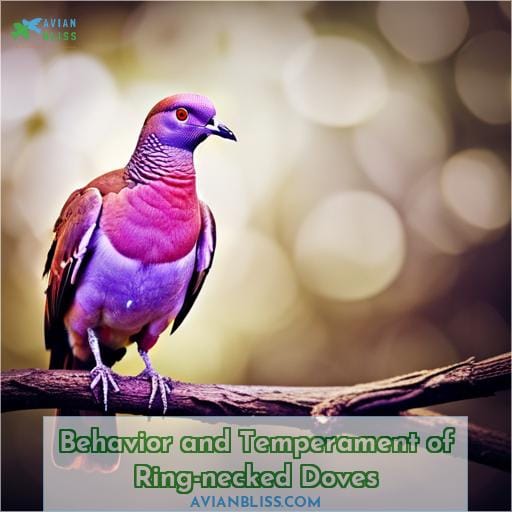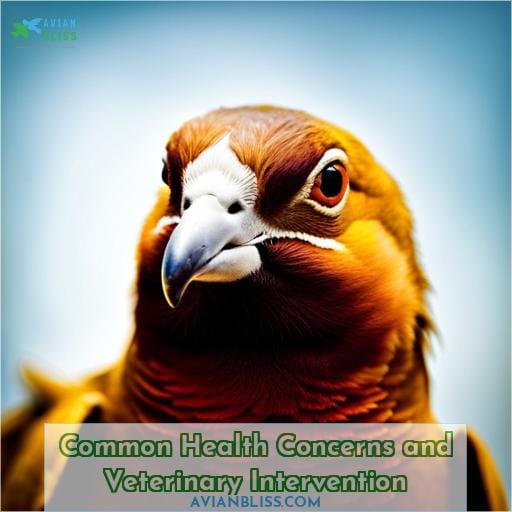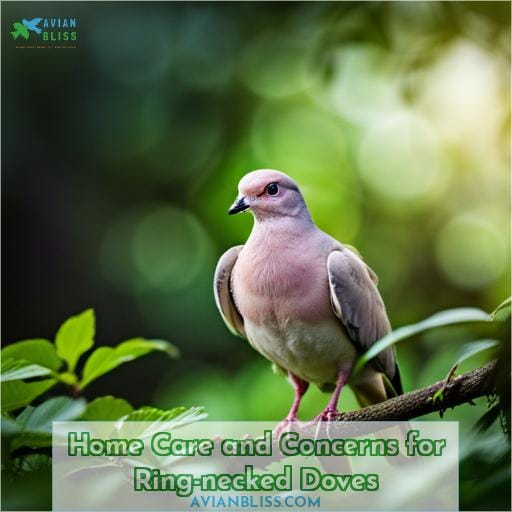This site is supported by our readers. We may earn a commission, at no cost to you, if you purchase through links.
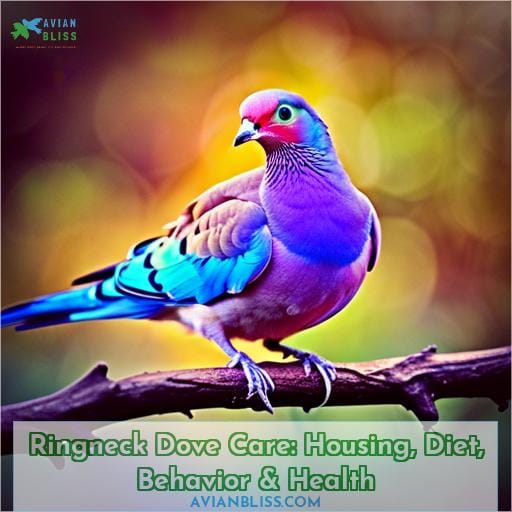 Imagine having a feathered companion that brings peace and tranquility to your home. The ringneck dove, with its soft fawn feathers and distinctive black neck ring, is the perfect addition to your household.
Imagine having a feathered companion that brings peace and tranquility to your home. The ringneck dove, with its soft fawn feathers and distinctive black neck ring, is the perfect addition to your household.
Whether you’re an experienced bird owner or new to avian companionship, this article will guide you through everything you need to know about housing, diet, behavior, and health when it comes to caring for a ringneck dove.
Get ready for a delightful journey of discovery!
Table Of Contents
- Key Takeaways
- Description and Physical Characteristics
- Native Habitat and Adaptability
- Care and Housing Requirements for Ring-necked Doves
- Behavior and Temperament of Ring-necked Doves
- Common Health Concerns and Veterinary Intervention
- Home Care and Concerns for Ring-necked Doves
- Frequently Asked Questions (FAQs)
- What is the typical lifespan of a ringneck dove?
- How can I identify the gender of my ringneck dove?
- What permits or licenses are required to own a ringneck dove?
- What toys or accessories are recommended for a ringneck dove’s cage?
- How often should the cage and accessories be cleaned for a ringneck dove?
- Conclusion
Key Takeaways
- Ring-necked doves have fawn-colored plumage with a black ring around their necks and average about 12 inches in length.
- They are native to Africa but can thrive well outside their native habitat in woodlands, grasslands, and savannas.
- Care and housing requirements for ring-necked doves include roomy cages with multiple perches and a bird bath, as well as providing seeds, grit, and calcium supplementation.
- Ring-necked doves have a gentle demeanor and calm temperament, making them easily hand-tamed, and they display unique courtship behaviors and diverse nesting habits.
Description and Physical Characteristics
If you’re considering caring for a Ring-necked Dove, it’s important to familiarize yourself with their distinctive appearance and physical characteristics.
Ringneck Doves are domesticated animals commonly kept in captivity as aviary birds.
They’ve an average length of about 12 inches and sport fawn-colored plumage with a distinctive black ring around their necks.
Their feet are pinkish-red, complementing their brown eyes and beak.
These doves originate from Africa but can adapt well to different environments, thriving particularly in warm climates like the Southern states of Georgia and Florida.
In terms of nesting habits, they display flexibility by breeding even in feeding bowls if necessary.
Understanding these physical attributes such as size characteristics, coloration traits,and plumage details will help you provide appropriate care for your beloved Ring-necked Dove companion.
Native Habitat and Adaptability
Now that you have learned about the physical characteristics of Ringneck Doves, let’s delve into their natural habitat and adaptability.
These doves are native to Africa and can be found in various regions, showcasing their remarkable adaptability to different environments.
- Natural Range: Ringneck Doves originated in Africa, specifically in Southern states like Georgia and Florida.
- Environmental Preferences: They’re agile flyers that feel at home in diverse habitats such as woodlands, grasslands, and savannahs.
- Regional Variations: The presence and abundance of these doves may vary across different regions due to factors like climate conditions or availability of resources.
- Adaptation Abilities: With ground foraging habits and an ability to thrive well even outside their native habitat, they can easily adjust to living conditions both indoors (as pets) or outdoors (in bird sanctuaries).
Understanding the ringneck dove’s natural range helps us appreciate its versatility as a species while considering how best we can provide suitable housing for them.
Care and Housing Requirements for Ring-necked Doves
Your ringneck doves require:
- Roomy cages with ample space for flight
- Multiple perches for foot health
- Regular access to a bird bath for bathing opportunities within their habitat
Proper diet including seeds, grit, and calcium supplementation is essential for their health and can help them live over 10 years when cared for correctly.
Housing Needs and Cage Requirements
With their agile flying abilities and need for space, ringnecks require:
- Wide cages with ample room for flight
- Multiple perches for foot health
Aviary space is essential to ensure they can:
- Spread their wings
- Engage in natural behaviors like flight exercise
Providing roosting perches allows them to:
- Rest comfortably
Bathing opportunities help maintain:
- Feather condition
Cage enrichment such as toys and puzzles can also enhance their well-being in captivity.
Dietary Requirements and Feeding Recommendations
To properly care for your Ring-necked dove, it’s important to understand their dietary requirements and feeding recommendations.
Ensure a nutritional balance by providing a variety of seeds in their diet.
Feed them twice daily to maintain optimal health and energy levels.
Include calcium sources like crushed eggshells or cuttlebone for proper bone development.
Occasionally offer supplemental treats such as fresh fruits and vegetables to add enrichment to their diet routine.
Behavior and Temperament of Ring-necked Doves
Ring-necked doves, known for their gentle demeanor and lack of aggression, exhibit a calm temperament that makes them suitable companions.
They’re easily hand-tamed but often prefer less interaction, making them low-maintenance pets.
Additionally, these doves have flexible nesting behavior and can breed readily even in captive environments.
Personality Traits and General Behavior
When caring for Ring-necked doves, you’ll notice their gentle demeanor and preference for being in pairs.
These doves exhibit a range of personality traits, including calmness and docility. They’re known to be easily hand-tamed but may prefer less interaction with humans.
Their social dynamics involve forming strong bonds with a mate or companion dove.
In terms of behavior, they display predictable patterns such as nesting flexibility and prolific breeding tendencies.
Vocal expressions include soothing cooing sounds similar to pigeons’ laughing calls.
Nesting Behavior and Breeding Characteristics
One of the key aspects of caring for your Ring-necked dove is understanding their nesting behavior and breeding characteristics.
These doves exhibit fascinating reproductive behaviors, including unique courtship displays and mating rituals.
They’ve diverse nesting habits, often adapting to different environments and even breeding in feeding bowls.
Understanding their breeding patterns can help ensure successful reproduction and provide opportunities for wildlife rescue or bird rehabilitation efforts.
Additionally, it’s interesting to note that some color variations may be observed during courtship displays.
Common Health Concerns and Veterinary Intervention
Now let’s turn our attention to the common health concerns that can affect ringneck doves, as well as the veterinary interventions and treatment options available.
By closely observing the health condition and symptoms exhibited by your dove, you can identify potential issues such as reduced food intake or respiratory problems. Prompt veterinary intervention is crucial in addressing these concerns and ensuring appropriate treatment measures are implemented for optimal care of your bird companion.
Observations of Health Condition and Symptoms
As you continue to observe the behavior and temperament of your Ring-necked Dove, it’s important to be aware of any potential health concerns and symptoms that may arise.
- Diagnostic challenges can arise due to their small size and subtle symptoms.
- Medication impacts should be considered, as some medications can affect appetite or calcium absorption.
- Dietary adjustments may be necessary during illness or medication administration for optimal recovery in a home environment.
Veterinary Interventions and Treatment Options
If your Ring-necked Dove experiences any health concerns, it’s important to seek veterinary intervention and explore appropriate treatment options.
A professional avian veterinarian can provide expert guidance on treatment strategies and medication considerations specific to your dove’s condition.
They’ll monitor the recovery progress closely, adjusting therapeutic approaches as needed.
Additionally, they can offer recommendations for post-intervention care to ensure the best possible outcome for your beloved bird companion.
Home Care and Concerns for Ring-necked Doves
When caring for your ringneck dove at home, pay close attention to their droppings and watch for potential weight fluctuations.
Look for changes in the volume, consistency, and content of droppings as this can indicate health issues.
Weigh your dove regularly to track any concerning weight loss that may need veterinary attention.
Home Care Tips and Recommendations
For optimal home care of your Ring-necked doves, ensure that you provide them with:
- A spacious cage
- Regular exercise opportunities
To maintain their feather health, offer bathing options and encourage natural preening behaviors.
These social creatures thrive on interaction, so make time for bonding moments with:
- Gentle handling
- Soothing cooing sounds
Environmental enrichment such as perches, toys, and mirrors can prevent boredom and promote mental stimulation.
Consider incorporating nutritional supplements into their diet to support overall health.
Lastly, regularly monitor their well-being through diligent health checks to catch any potential issues early on.
Monitoring Droppings and Potential Weight Fluctuations
How do you vigilantly monitor a dove’s droppings and weight while providing home care?
Certainly! Here are five two-word discussion ideas related to monitoring droppings and potential weight fluctuations for Ringneck Dove care:
- Dietary adjustments
- Hydration levels
- Nutritional balance
- Dropping analysis
- Weight management
By observing changes in droppings such as color, consistency, or odor and regularly weighing your dove using a scale designed for small animals like birds can help you track their health status accurately.
Frequently Asked Questions (FAQs)
What is the typical lifespan of a ringneck dove?
You’ll find ringneck doves can live 10-15 years with proper care.
Provide a spacious cage, balanced diet, calcium supplements, regular bathing and ample flights.
Monitor for signs of illness, allow resting periods after breeding, and schedule annual vet checkups.
With attentive care, their gentle nature and melodic coos will grace your home for over a decade.
How can I identify the gender of my ringneck dove?
To determine the gender of your ringneck dove, observe its physical characteristics.
Males typically have a thicker neck and coarser feathers than females.
What permits or licenses are required to own a ringneck dove?
To legally own a ringneck dove, you may need permits or licenses depending on your location.
Check with local authorities or avian organizations for specific requirements to ensure compliance and responsible ownership of these captivating birds.
What toys or accessories are recommended for a ringneck dove’s cage?
Provide safe, natural branches and twigs for perching.
Offer chew toys, mineral blocks, and cuttlebones to trim their beaks.
Mirrors can stimulate but may stress some birds.
Rotate novel toys to prevent boredom and enrich their environment.
How often should the cage and accessories be cleaned for a ringneck dove?
To maintain a clean and healthy environment for your ringneck dove, it’s recommended to clean the cage and accessories at least once a week.
Conclusion
Like a gentle whisper in the breeze, the soft coos of your ringneck dove will soothe your soul.
Providing proper housing, an enriching diet, and attentive health monitoring allows these docile companions’ bubbly personalities to shine.
With time and patience, your friendship will deepen as you learn to interpret their unique behaviors.
Cherish each special moment with your feathered friend; their delicate beauty and loyal companionship is a gift to be treasured.

